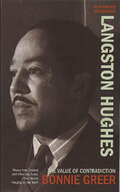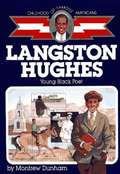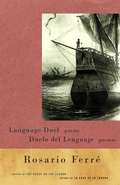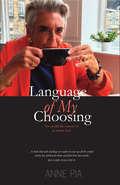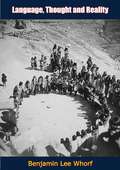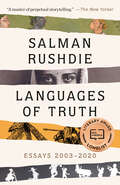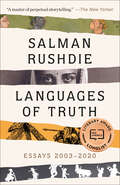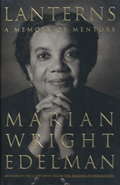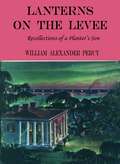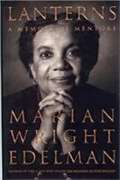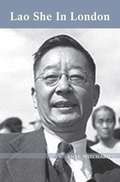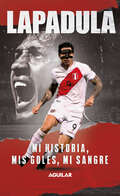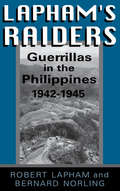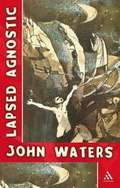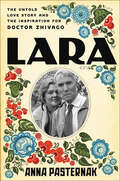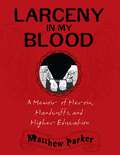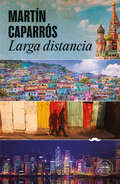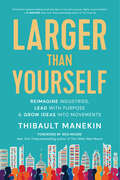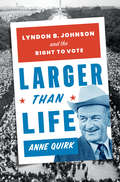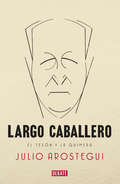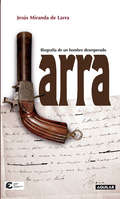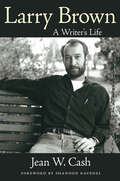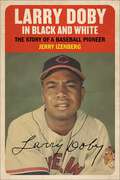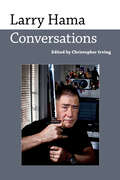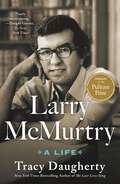- Table View
- List View
Langston Hughes: The Value of Contradiction
by Bonnie GreerLangston Hughes was a man far ahead of his time, but his actions were often unpredictable, contradictory and refused classification. To give an example, he campaigned tirelessly for civil rights but then testified before the controversial House Committee on Un-American Activities, seen by many as a witch-hunt. Rather than ignoring or excusing these contradictions, Bonnie Greer confronts them, highlighting the many contradictions present in both his day and ours and painting an unforgettable portrait of a man caught up in strange and contradictory times.
Langston Hughes: Young Black Poet (Childhood of Famous Americans Series)
by Montrew DunhamFocuses on the early years of the well-known poet, Langston Hughes, whose writings reflect the everyday experiences of African Americans.
Language Duel/ Duelo del Lenguaje
by Rosario Ferré"English and Spanish have been at war since Queen Elizabeth sank King Felipe's Spanish Armada in 1588," Rosario Ferré writes in the title poem of Language Duel; "Language carries with it all their fire and power." She explores this tension throughout this explosive collection, which plays with the sensual differences between the languages and lays bare many of the complications facing an increasingly bilingual America. In these poems, Miami is celebrated as a modern Tower of Babel and a place where the layers of history are particularly palpable. Wave after wave of conquerors wash across the Americas. A well-dressed Latino businessman inadvertently reveals his roots at the Ritz when someone steps on his foot, eliciting a profanity--in Spanish. Intimate snapshots capture the nameless heroism of homeless men, the exuberance of a child's affection for her hometown, and memories of lovers. "El español y el inglés han estado en guerra desde que la Reina Isabel hundió la Armada Invencible en el 1588", escribe Rosario Feré en "Duelo del lenguaje", el poema que da el título a esta colección; "los lenguajes llevan con sigo todo su fuego y poderío". Ferré explora las tensiones entre lenguas y culturas a través de esta colección de carácter controversial, que señala muchos de los dilemas a los que se enfrenta hoy una América cada vez más bilingüe. Estos poemas celebran tanto la antiquísima ciudad San Juan como las metrópolis más modernas: Miami, Nueva York, WDC. Pasado y presente, historia y sociedad se mezclan con una inmediatez sorprendente. Ola tras ola de conquistadores estalla sobre Norte América; un hombre de negocios bien vestido inesperadamente revela sus raíces cuando alguien le da un pisotón en el elevador del Ritz y suelta una maldición. Fotos instantáneas de los deambulantes que se desplazan por las calles de la capital, el cariño exuberante que siente un niño por su ciudad natal, los amantes cuya memoria perdura en el recuerdo, el rumor de la lluvia en el patio de atrás, que lava el remordimiento: he aquí algunos de los temas a la vez poéticos y cotidianos que se recogen en este libro.
Language of My Choosing: A Creative Scots-italian Memoir
by Anne PiaWhere do I truly belong? This is the question Anne Pia continually asked of herself growing up in the Italian-Scots community of post-World War Two Edinburgh.This candid, vibrant memoir shares her struggle to bridge the gap between a traditional immigrant way of life and attaining her goal of becoming an independent-minded professional woman.Through her journey beyond the expectations of family, she discovers how much relationships with other people enhance, inhibit and ultimately define self. Yet – like her relationship with her own mother – her ‘belonging’ in her Italian and Scottish heritages remains to this day unresolved and complex.
Language, Thought and Reality: Selected Writings (The\mit Press Ser.)
by Benjamin Lee WhorfWritings by the pioneering linguist Benjamin Whorf, including his famous work on the Hopi language as well as general reflections on language and meaning. The pioneering linguist Benjamin Whorf (1897–1941) grasped the relationship between human language and human thinking: how language can shape our innermost thoughts. His basic thesis is that our perception of the world and our ways of thinking about it are deeply influenced by the structure of the languages we speak. The writings collected in this volume include important papers on the Maya, Hopi, and Shawnee languages as well as more general reflections on language and meaning.—Print ed.
Languages of Truth: Essays 2003-2020
by Salman RushdieNewly collected, revised, and expanded non-fiction--including one original essay--from the first two decades of the twenty-first century by the Booker Prize-winning, internationally bestselling author. <P><P> Salman Rushdie is celebrated as a storyteller of the highest order, illuminating deep truths about our society and culture through his gorgeous, often searing, prose. Now, in his latest collection of non-fiction, he brings together insightful and inspiring essays, criticism, and speeches that focus on his relationship with the written word, and solidify his place as one of the most original thinkers of our time. <P><P> Gathering pieces written between 2003 and 2020, Languages of Truth chronicles Rushdie's own intellectual engagement with a period of momentous cultural shifts. Immersing the reader in a wide variety of subjects, he delves into the nature of storytelling as a deeply human need, and what emerges is, in myriad ways, a love letter to literature itself. Rushdie explores what the work of authors from Shakespeare and Cervantes to Samuel Beckett, Eudora Welty, and Toni Morrison mean to him, often by telling vivid, sometimes humorous stories of his own personal encounters with them, whether on the page or in person. <P><P> He delves deeper than ever before into the nature of "truth," revels in the vibrant malleability of language, and the creative lines that can join art and life, and he looks anew at migration, multiculturalism and censorship. The ideas, true stories, and arguments presented here are at once revelatory, funny, and eye-opening, enlivened on every page by Rushdie's signature wit and dazzling voice, making this volume a genuine pleasure to read. <P><P> Languages of Truth offers the author's most piercingly analytical views yet on the evolution of literature and culture even as he takes us deep into his own exuberant and fearless imagination.
Languages of Truth: Essays 2003-2020
by Salman RushdieNewly collected, revised, and expanded nonfiction from the first two decades of the twenty-first century—including many texts never previously in print—by the Booker Prize–winning, internationally bestselling authorSalman Rushdie is celebrated as a storyteller of the highest order, illuminating truths about our society and culture through his gorgeous, often searing prose. Now, in his latest collection of nonfiction, he brings together insightful and inspiring essays, criticism, and speeches that focus on his relationship with the written word and solidify his place as one of the most original thinkers of our time.Gathering pieces written between 2003 and 2020, Languages of Truth chronicles Rushdie&’s intellectual engagement with a period of momentous cultural shifts. Immersing the reader in a wide variety of subjects, he delves into the nature of storytelling as a human need, and what emerges is, in myriad ways, a love letter to literature itself. Rushdie explores what the work of authors from Shakespeare and Cervantes to Samuel Beckett, Eudora Welty, and Toni Morrison mean to him, whether on the page or in person. He delves deep into the nature of &“truth,&” revels in the vibrant malleability of language and the creative lines that can join art and life, and looks anew at migration, multiculturalism, and censorship.Enlivened on every page by Rushdie&’s signature wit and dazzling voice, Languages of Truth offers the author&’s most piercingly analytical views yet on the evolution of literature and culture even as he takes us on an exhilarating tour of his own exuberant and fearless imagination.
Lanterns
by Marian Wright EdelmanI am grateful beyond words for the example of the lanterns shared in this memoir whose lives I hope will illuminate my children's, your children's, and the paths of countless others coming behind.--Marian Wright Edelman, from the PrefaceMarian Wright Edelman, "the most influential children's advocate in the country" (The Washington Post), shares stories from her life at the center of this century's most dramatic civil rights struggles. She pays tribute to the extraordinary personal mentors who helped light her way: Martin Luther King, Jr., Robert F. Kennedy, Fannie Lou Hamer, William Sloane Coffin, Ella Baker, Mae Bertha Carter, and many others.She celebrates the lives of the great Black women of Bennettsville, South Carolina-Miz Tee, Miz Lucy, Miz Kate-who along with her parents formed a formidable and loving network of community support for the young Marian Wright as a Black girl growing up in the segregated South. We follow the author to Spelman College in the late 1950s, when the school was a hotbed of civil rights activism, and where, through excerpts from her honest and passionate college journal, we witness a national leader in the making and meet the people who inspired and empowered her, including Dr. Benjamin E. Mays, Howard Zinn, and Charles E. Merrill, Jr.Lanterns takes us to Mississippi in the 1960s, where Edelman was the first and only Black woman lawyer. Her account of those years is a riveting first-hand addition to the literature of civil rights: "The only person I recognized in the menacing crowd as I walked towards the front courthouse steps was [a] veteran New York Times reporter. He neither acknowledged me nor met my eyes. I knew then what it was like to be a poor Black person in Mississippi: alone." And we follow Edelman as she leads Bobby Kennedy on his fateful trip to see Mississippi poverty and hunger for himself, a powerful personal experience for the young RFK that helped awaken a nation's conscience to child hunger and poverty. Lanterns is illustrated with thirty of the author's personal photographs and includes "A Parent's Pledge" and "Twenty-five More Lessons for Life," an inspiration to all of us-parents, grandparents, teachers, religious and civic leaders-to guide, protect, and love our children every day so that they will become, in Marian Wright Edelman's moving vision, the healing agents for national transformation.
Lanterns on the Levee
by William Alexander PercyMany of the earliest books, particularly those dating back to the 1900s and before, are now extremely scarce and increasingly expensive. We are republishing these classic works in affordable, high quality, modern editions, using the original text and artwork.
Lanterns: A Memoir of Mentors
by Marian Wright EdelmanMemoir by founder of the Children's Defense Fund with portraits of the many mentors who helped shape her.
Lao She in London
by Anne WitchardLao She remains revered as one of China's great modern writers. His life and work have been the subject of volumes of critique, analysis and study. However, the four years the young aspiring writer spent in London between 1924 and 1929 have largely been overlooked. Dr Anne Witchard, a specialist in the modernist milieu of London between the wars, reveals Lao She's encounter with British high modernism and literature from Dickens to Conrad to Joyce. Lao She arrived from his native Peking to the whirl of London's West End scene - Bloomsburyites, Vorticists, 'avant-gardists' of every stripe, Ezra Pound and the cabaret at the Cave of The Golden Calf. Immersed in the West End 1920s world of risque flappers, the tabloid sensation of England's 'most infamous Chinaman Brilliant Chang' and Anna May Wong's scandalous film 'Piccadilly', simultaneously Lao She spent time in the notorious and much sensationalised East End Chinatown of Limehouse. Out of his experiences came his great novel of London Chinese life and tribulations - 'Mr Ma and Son: Two Chinese in London' ('Er Ma', 1929). However, as Witchard reveals, Lao She's London years affected his writing and ultimately the course of Chinese modernism in far more profound ways.
Lapadula: Mi historia, mis goles, mi sangre
by Gianluca LapadulaLA AUTOBIOGRAFÍA DEL JUGADOR DEL MOMENTO Desde su llegada a la selección, Gianluca Lapadula no ha dejado de llenar de esperanza los corazones de millones de peruanos que sueñan con asistir al mundial de fútbol Catar 2022. El coraje con el que defiende la camiseta blanquiroja ha sido fundamental para lograr ese anhelado objetivo. Las páginas de este libro relatan con voz personal e íntima el nacimiento de una vocación indoblegable dedicada al fútbol. Los vaivenes entre Italia y el Perú, las prácticas en la niñez y juventud, los primeros goles fundamentales, la experiencia de los fracasos y éxitos, así como la adopción de una patria redescubierta son algunos de los temas centrales que el lector hallará en sus páginas. Esta edición llega acompañada de imágenes personales de sus inicios como jugador, así como de su fuero más íntimo. Esta autobiografía de Gianluca Lapadula expresa conemoción los recuerdos y vivencias de un jugador que ha convertido su entrega por el equipo peruano en su marca personal. Un atleta cuyo sacrificio sobre el césped ha contagiado de emoción e ilusión a todo un país, y lo han convertido en ejemplo de mixtura, integración y orgullo para todos los peruanos.
Lapham's Raiders: Guerrillas in the Philippines, 1942–1945
by Robert Lapham Bernard NorlingA US soldier recounts his extensive guerilla campaign against the Japanese occupation of the Philippines in this thoroughly researched WWII memoir.On December 8th, 1941, the day after the attack on Pearl Harbor, the Japanese invaded the Philippine Islands, catching American forces unprepared and forcing their eventual surrender. Among the American soldiers who managed to avoid capture was twenty-five-year-old Lieutenant Robert Lapham, who played a major role in the resistance to the brutal Japanese occupation.After emerging from the jungles of Bataan, Lapham built and commanded a devastating guerrilla force behind enemy lines. His Luzon Guerrilla Armed Forces evolved into an army of thirteen thousand men that eventually controlled the entire northern half of Luzon's great Central Plain, an area of several thousand square miles. In Lapham’s Raiders, Lapham and historian Bernard Norling reconstruct the drama of the LGAF through letters, records and the recollections of Lapham and others.Lapham’s Raiders sheds light on the clandestine activities of the LGAF and other guerrilla operations, assess the damages of war to the Filipino people, and discuss the United States' postwar treatment of the newly independent Philippine nation. It also examines Japan's wartime failures in the Philippines and elsewhere, and of America's postwar failure to fully realize opportunities there.
Lapsed Agnostic
by John WatersIrish Times columnist tells of his initial faith, his loss of it, and finally how he regained it.
Lara: The Untold Love Story and the Inspiration for Doctor Zhivago
by Anna PasternakLara is the heartbreaking story of lovers Boris Pasternak, the author of Doctor Zhivago, and Olga Ivinskaya—the true tragedy behind the timeless classic.“Anna Pasternak does not spare an ounce of drama nor detail from the story of her great-uncle’s love affair with Olga Ivinskaya, the inspiration for Doctor Zhivago’s Lara. The result is a profoundly moving meditation on love, loyalty and, ultimately, forgiveness.” —New York Times–bestselling author Amanda ForemanWhen Stalin came into power in 1924, the Communist government began persecuting dissident writers. Though he spared the life of Boris Pasternak—whose novel-in-progress, Doctor Zhivago, was suspected of being anti-Soviet—Stalin persecuted Boris’s mistress, typist, and literary muse, Olga Ivinskaya. Boris’s affair devastated the Pasternaks, and they were keen to disavow Olga’s role in Boris’s writing. Twice sentenced to work in Siberian labor camps, Olga was interrogated about Boris’s book, but she didn’t betray the man she loved. Released from the gulags, Olga assumed that Boris would leave his wife for her but, trapped by his family’s expectations and his own weak will, he never did. Drawing on previously neglected family sources and original interviews, Anna Pasternak explores her great-uncle’s hidden act of moral compromise, and restores to history the passionate affair that inspired and animated Doctor Zhivago. Devastated that Olga suffered on his behalf and frustrated that he could not match her loyalty to him, Boris instead channeled his thwarted passion for her into his novel’s love story. Filled with the rich detail of Boris’s secret life, Lara unearths a moving love story of courage, loyalty, suffering, drama, and loss, casting a new light on the legacy of Doctor Zhivago.
Larceny in My Blood: A Memoir of Heroin, Handcuffs, and Higher Education
by Matthew J. ParkerA fully illustrated graphic memoir of a child of the '60s who was raised into a life of crime and addiction —but graduated into freedom. Matthew Parker was in his mid-forties when he started college. He&’d been sidetracked: Eleven years were eaten up by serving time in various county jails, state penitentiaries, and federal prison. He&’d been arrested more than thirty times, racking up eight felonies in a crime career that began at age thirteen, when he started dealing pot. When he got out of prison for the last time and kicked his heroin addiction, he was determined to spend the next chapter of his life in the classroom. And he did just that, going on to complete a master&’s degree from Columbia University&’s highly competitive creative writing program.Through captivating black-and-white illustrations drawn in a distinctively primitive style, Larceny in My Blood flashes back on Parker's childhood, with memories of a loving but lawless mother teaching him that breaking the law was the way to survive. From there it moves to an account of Parker&’s lost decades, where he resorted to petty crime to support a heroin habit. After years of fighting the system, Parker sees the light and Larceny in My Blood becomes a poignant portrait of a man trying to find his way in the straight and narrow. A unique memoir, Parker&’s images and words form a mesmerizing road to redemption.
Larga distancia
by Martín CaparrósEn Larga distancia Martín Caparrós cuenta los relatos de un viajero que sabe encontrar los detalles más interesantes de los lugares que visita. Su mirada logra hacernos cómplice de las revelaciones que descubre en cada lugar. Hoy un clásico, Larga distancia fue pionero en los noventa cuando nadie en la Argentina se animaba a editar «crónicas». Un libro en el que, según Tomás Eloy Martínez, Caparrós consiguió lo que todo escritor persigue: encontrar su propia voz, «una voz conmovedora, memorable, que no se parece a ninguna otra».Por sus páginas desfilan la Unión Soviética a punto de caer; Hong Kong y el espíritu del capital; la nueva China rosa; los inicios de Evo Morales como líder cocalero; la lucha entre el vudú y la cruz en Haití; la epidemia de cólera y los bebés vendidos en Perú; una rara entrevista con Malcolm Lowry; un largo viaje en barco por los ríos del Paraguay; las últimas horas en La Higuera de Ernesto Guevara, «uno de los primeros argentinos que triunfó en el exterior», y tantas otras historias. Críticas:«Martín Caparrós, uno de los más geniales cronistas contemporáneos, depura de manera exquisita, emocionada, vibrante y distanciada una prosa de un poderío narrativo excepcional».Fernando R. Lafuente, ABC Cultural «Caparrós es un maestro de la crónica».Juan Villoro, Reforma «Es una obra rica y ambiciosa, una empresa arriesgada que debe ser conocida».Juan Goytisolo «Caparrós provoca esa necesidad sonriente de subrayar, compartir en redes, reproducir sus trallazos».Nadal Suau, El Cultural «El mejor cronista actual de América Latina: un soberbio entrevistador, un viajero dotado de cultura enciclopédica y de una fina ironía».Roberto Herrscher, La Vanguardia«Su prosa y su mirada son un reactivo fuerte para almas sensibles o amigas de lo políticamente correcto».Leila Guerriero, El País
Larger Than Yourself: Reimagine Industries, Lead with Purpose & Grow Ideas into Movements
by Thibault ManekinDARE TO CHANGE THE WORLD Why do some great ideas take off and soar, while others never get off the ground? Where does that elusive sense of being part of something larger than ourselves come from? How can each of us harness that feeling to help fuel the world’s best ideas and turn them into movements? In Larger Than Yourself, Thibault Manekin tells gripping stories about inspirational people and pivotal moments that answer these questions at a time when social entrepreneurship is no longer a buzzword but a global necessity. He shares his experiences helping to bridge social divides in war-torn countries through sports and reimagining the real estate industry so that buildings empower communities and unite cities, illustrating how we all can turn ideas into movements. The seven distinct lessons that emerge become actionable principles for the doers and dreamers of today, inspiring you with takeaways to assist in the pursuit of your own endeavors.
Larger than Life: President Lyndon B. Johnson And The Passing Of The Voting Rights Act
by Anne QuirkAn accessible, informed, and timely biography of Lyndon Johnson that centers his life and presidency around the passage of the Voting Rights Act. Keenly known for both his triumphs and his failures, Lyndon B. Johnson was one of the most complex and compelling presidents in US history. Anne Quirk’s biography alternates between chapters that follow LBJ’s childhood in rural Texas learning politics from his parents, his time teaching Mexican American students at a small-town school, and his days in Congress as majority leader and as vice president; and chapters that cover his work alongside civil rights leaders and the passage of the Voting Rights Act. An epilogue discusses the Supreme Court’s 2013 ruling that struck down key portions of the act. With engaging storytelling, Quirk paints a rich portrait of Johnson’s presidency, celebrating the accomplishments of his Great Society programs while refusing to shy away from his catastrophic decisions regarding Vietnam and the summer riots of 1967. Larger Than Life presents striking parallels to today’s political arena: an outsize character presiding over a divided nation—but to different ends.
Largo Caballero: El tesón y la quimera
by Julio ArosteguiLa biografía definitiva de un líder político fundamental del siglo XX español. Francisco Largo Caballero (Madrid, 15 de octubre de 1869 - París, 23 de marzo de 1946), «el Lenin español», fue un sindicalista y político, histórico dirigente del Partido Socialista Obrero Español y la Unión General de Trabajadores. Aunque el socialismo español siempre ha reservado un lugar de honor a Pablo Iglesias, su fundador, Francisco Largo Caballero fue el dirigente obrero más relevante e influyente en la España del siglo pasado. Largo Caballero apareció como el auténtico heredero de Iglesias. Arquetipo de dirigente de masas, sindicalista, político, ministro y presidente del Gobierno, promotor y mantenedor de proyectos societarios durante cincuenta años de militancia, el momento culminante de su trayectoria llegó en los años treinta, ya a una edad avanzada. La personalidad y la actuación de Largo Caballero fueron siempre complejas, poliédricas e incluso contradictorias. Le tocó vivir tiempos convulsos en primera línea de la política: la dictadura de Primo de Rivera, la República y la guerra civil. Su liderazgo y sus decisiones han sido muy criticados y su figura, tergiversada con frecuencia, ha concitado a menudo opiniones adversas, con pocas aunque notables excepciones. Este libro no es una reivindicación de su papel histórico ni una hagiografía. Pero una historia rigurosa no puede basarse sino en los instrumentos auténticos de la historiografía: documentación y argumentación. Esa ha sido la extraordinaria tarea de Julio Arostegui: despejar los mitos y los prejuicios y buscar la verdad histórica. El resultado es «otro» Largo Caballero bien distinto del que ha presentado la literatura al uso y uno de los retratos más fieles de una figura fundamental para la historia del siglo XX. Porque para entender el presente hay que estudiar el pasado.
Larra: Biografía de un hombre desesperado
by Jesús Miranda de LarraBiografía revisada sobre Larra, escrita por uno de sus descendientes, llena de documentos testimoniales que ponen de relieve la tormentosa vida de uno de los escritores españoles más importantes del XIX, padre del periodismo actual. Mariano José de Larra deambula por las frías calles de un Madrid en máscaras, desengañado con el tiempo que le ha tocado vivir. Ni su literatura ni su inteligencia ni sus esperanzas son capaces de salvarlo del vacío. Ni siquiera el amor... esa débil llama que por unos minutos ha alentado su corazón. En ese instante sabe que el momento que había imaginado e incluso deseado en horas pasadas ha llegado. Consciente de que no existe un más allá, quiere acabar con la pesadilla que lo atormenta y se dirige a su casa. Una vez allí, mientras observa la desesperación «su propio rostro» en el espejo, espera la visita de Dolores Armijo como última posibilidad de salvación, pero al fin siente el frío aliento del revólver y el mudo sonido del gatillo. Con motivo del bicentenario de Larra, aparece una biografía completa sobre su figura, escrita por uno de sus descendientes, llena de documentos testimoniales -algunos de ellos inéditos- que ponen de relieve la tormentosa vida de uno de los escritores españoles más importantes del siglo XIX, padre del periodismo actual. Un homenaje que permite mantener viva la figura de Larra, amante de la libertad y de la justicia, adelantado generador de ideas y excelso prosista. Su obra es un toque de atención permanente y angustiado. Una llamada comprometida que le causó un gran conflicto interior. Por ello tiene un interés especial en nuestro tiempo y es interesante destacar su visión como la de un pensador moderno, e incluso posmoderno, que utilizó el periodismo como el mejor medio para hacer llegar sus ideas al mayor número de personas.
Larry Brown: A Writer's Life (Willie Morris Books in Memoir and Biography)
by Jean W. CashLarry Brown (1951–2004) was unique among writers who started their careers in the late twentieth century. Unlike most of them—his friends Clyde Edgerton, Jill McCorkle, Rick Bass, and Kaye Gibbons, among others—he was neither a product of a writing program, nor did he teach at one. In fact, he did not even attend college. His innate talent, his immersion in the life of north Mississippi, and his determination led him to national success. Drawing on excerpts from numerous letters and material from interviews with family members and friends, Larry Brown: A Writer's Life is the first biography of a landmark southern writer. Jean W. Cash explores the cultural milieu of Oxford, Mississippi, and the writers who influenced Brown, including William Faulkner, Flannery O'Connor, Harry Crews, and Cormac McCarthy. She covers Brown's history in Mississippi, the troubled family in which he grew up, and his boyhood in Tula and Yocona, Mississippi, and in Memphis, Tennessee. She relates stories from Brown's time in the Marines, his early married life—which included sixteen years as an Oxford fireman—and what he called his “apprenticeship” period, the eight years during which he was teaching himself to write publishable fiction. The book examines Brown's years as a writer: the stories and novels he wrote, his struggles to acclimate himself to the fame his writing brought him, and his many trips outside Yocona, where he spent the last thirty years of his life. The book concludes with a discussion of his posthumous fame, including the publication of A Miracle of Catfish, the novel he had nearly completed just before his death. Brown's cadre of fans will relish this comprehensive portrait of the man and his work.
Larry Doby in Black and White: The Story of a Baseball Pioneer
by Jerry IzenbergWhen people think of baseball trailblazers, their minds immediately go to Jackie Robinson. He was the man who broke the color barrier, appearing in 1947 for the Brooklyn Dodgers, and would go on to a Hall of Fame career. His number 42 is retired throughout baseball, and every year MLB holds "Jackie Robinson Day" across the league. But he was far from the only trailblazer. That same year, a twenty-three-year-old Larry Doby appeared in a game for the Cleveland Indians. He is essentially known as the second African American to break the color barrier, and was the first to appear in the American League (as the Dodgers are in the National League). While Robinson is always the one to be spoken about, Doby was just as good in the field and at the plate. In fact, he was a 9x All-Star, a World Series champion (being the first African American, along with teammate Satchel Paige, to win a World Series), home run and batting champ, and was inducted into the National Baseball Hall of Fame in 1998 after an incredible 13-year MLB career. He is, and will always be, one of the greatest players in baseball history. Beginning his professional baseball career at the tender age of eighteen, he would play five years for the Newark Eagles of the Negro Leagues. In between, he spent two years out of baseball, defending his country in World War II as a member of the US Navy. While Robinson had instant success with the Dodgers, Doby struggled off the bat. Having to endure immense racism (from fans, other ballplayers, and even teammates), disrespect, and threats on his life (and that of his family), it did not take until the following year, 1948, before he truly emerged as one of the best players in the game. Written by esteemed author Jerry Izenberg--who saw Doby play with the Eagles as a youngster and would build a lifelong friendship with the ballplayer--Larry Doby is the real, raw story of perseverance and determination in the face of immense hatred. Including in-depth research, to go along with personal accounts and numerous one-on-one interviews, Izenberg delivers an incredible tale that gives Doby his due as one of the all-time greats, while also sharing the struggles, trials, and tribulations of being a black man in a white country. With Major League Baseball finally incorporating the records and stats of those in the Negro Leagues, Doby's story is one that is long-overdo, shedding light on what it was like playing baseball and being black in the 1940s and '50s, and how hard work and determination was key to rising above all the hate and becoming one of the greatest to ever play the game
Larry Hama: Conversations (Conversations with Comic Artists Series)
by Christopher IrvingLarry Hama (b. 1949) is the writer and cartoonist who helped develop the 1980s G.I. Joe toy line and created a new generation of fans from the tie-in comic book. Through many interviews, this volume reveals that G.I. Joe is far from his greatest feat as an artist. At different points in his life and career, Hama was mentored by comics legends Bernard Krigstein, Wallace Wood, and Neal Adams. Though their impact left an impression on his work, Hama has created a unique brand of storytelling that crosses various media. For example, he devised the character Bucky O'Hare, a green rabbit in outer space that was made into a comic book, toy line, video game, and television cartoon—with each medium in mind. Hama also discusses his varied career, from working at Neal Adams and Dick Giordano’s legendary Continuity to editing a humor magazine at Marvel, developing G.I. Joe, and enjoying a long run as writer of Wolverine. This volume also explores Hama's life outside of comics. He is an activist in the Asian American community, a musician, and an actor in film and stage. He has also appeared in minor roles on the television shows M*A*S*H and Saturday Night Live and on Broadway. Editor and historian Christopher Irving compiles six of his own interviews with Hama, some of which are unpublished, and compiled others that range through Hama’s illustrious career. The first academic volume on the artist, this collection gives a snapshot of Hama’s unique character-driven and visual approach to comics’ storytelling.
Larry McMurtry: A Life
by Tracy Daugherty*Pulitzer Prize Finalist* *Bonney MacDonald Award Winner for Outstanding Western Book* A biography of the late Pulitzer Prize-winning American novelist and screenwriter Larry McMurtry from New York Times bestselling author Tracy Daugherty.In over forty books, in a career that spanned over sixty years, Larry McMurtry staked his claim as a superior chronicler of the American West, and as the Great Plains’ keenest witness since Willa Cather and Wallace Stegner. Larry McMurtry: A Life traces his origins as one of the last American writers who had direct contact with this country’s pioneer traditions. It follows his astonishing career as bestselling novelist, Pulitzer-Prize winner, author of the beloved Lonesome Dove, Academy-Award winning screenwriter, public intellectual, and passionate bookseller. A sweeping and insightful look at a versatile, one-of-a-kind American writer, this book is a must-read for every Larry McMurtry fan.
